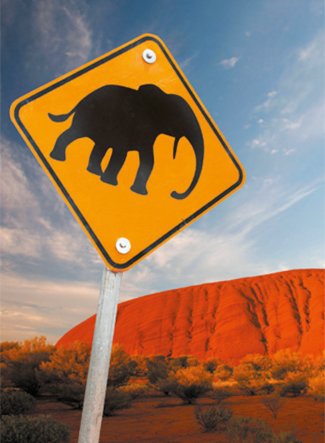Introduce elephants to Aussie bush, says scientist

AN AUSTRALIAN SCIENTIST looking to solve the problems of rampant bushfires and introduced species, has made the radical suggestion that wild African elephants should be introduced to the outback.
Professor David Bowman, an environmental scientist at the University of Tasmania, in Hobart, is the author of a commentary published today in the journal Nature, which considers the problems of bushfires and feral flora and fauna in a new light.
“The piece is intentionally challenging,” David says. “We are going to be driven, whether we like it or not, to think outside the square, because current approaches to land management in many of our landscape settings are not working.”
Holistic approach
Rather than the piecemeal methods that have been used so far to control individual feral plants and animals, David is proposing a more holistic approach. This looks to introduce large animals – such as elephants, rhinos and Komodo dragons – to eat flammable grasses and control species such as rabbits, goats and pigs, that have been all but impossible to manage.
“I realise that there are major risks associated with what I am proposing,” he says. “But the usual approaches to managing these issues aren’t working.”
He has opted for elephants because one major source of fuel for wildfires in northern Australia is gamba grass – a giant African species that is too big for native fauna and even feral buffalo to handle.
“Gamba grass is a great meal for elephants or rhinoceroses. The idea of introducing elephants may seem absurd, but the only other methods likely to control gamba grass involve using chemicals or physically clearing the land, which would destroy the habitat,” he says. “Using mega-herbivores may ultimately be more practical and cost-effective, and it would help to conserve animals that are threatened by poaching in their native environments.”

African elephants – coming to the bush near you soon? (Credit: Nature)
Long and troubled history
Australia has had a long and troubled history with both introduced species and bushfires. The Black Saturday bushfires in February 2009 consumed more than 400,000 hectares in southern Australia and claimed the lives of 173 people.
“That blaze was unusually fierce, but fires are a constant source of anxiety for Australia,” writes David. “The continent is extremely fire-prone… Lately, the fires have been more intense and widespread, perhaps as a result of climate change – last year, around 5 per cent of the continent was burnt.”
Other experts are sceptical that the idea could work in practice. One problem is that elephants will eat much more than just gamba grass, says Professor Patricia Werner, an ecologist at the Australian National University in Canberra.
“They eat not only grass but leaves, twigs, fruits, roots and even bark,” she says. “An adult elephant can eat 150-300kg of vegetation a day, only about half of which is grass. Are we in Australia prepared to try yet another landscape-scale ‘experiment’ and merely hope that the elephants don’t find our native Australian trees tasty?”
Fresh thinking
“Professor Bowman is obviously trying to raise some very important issues that we face in Australia; the problem is that his comments are careless,” argues Dr Ricky Spencer, with the Native and Pest Animal Unit at the University of Western Sydney. “If we did go down the road of introducing elephants Australia, we had better develop the technology to clone sabre-tooth tigers to eventually control the elephants.”
Dr Don Driscoll, a fellow at the Australian National University’s Fenner School of Environment and Society commends David for generating debate.
“Australian ecosystems are in a desperate state of degradations due to invasive plants and animals,” he says. “We need to put all of the management options on the table to try to find ways of reducing the rate at which our biodiversity succumbs to the impacts of invasive alien species.”
Whatever the answer to Australia’s environmental woes is, it’s not going to be easy, agrees David. “We’ve got some big challenges ahead, that’s the point… Challenges open up really fresh thinking which is what we need.”
RELATED STORIES




